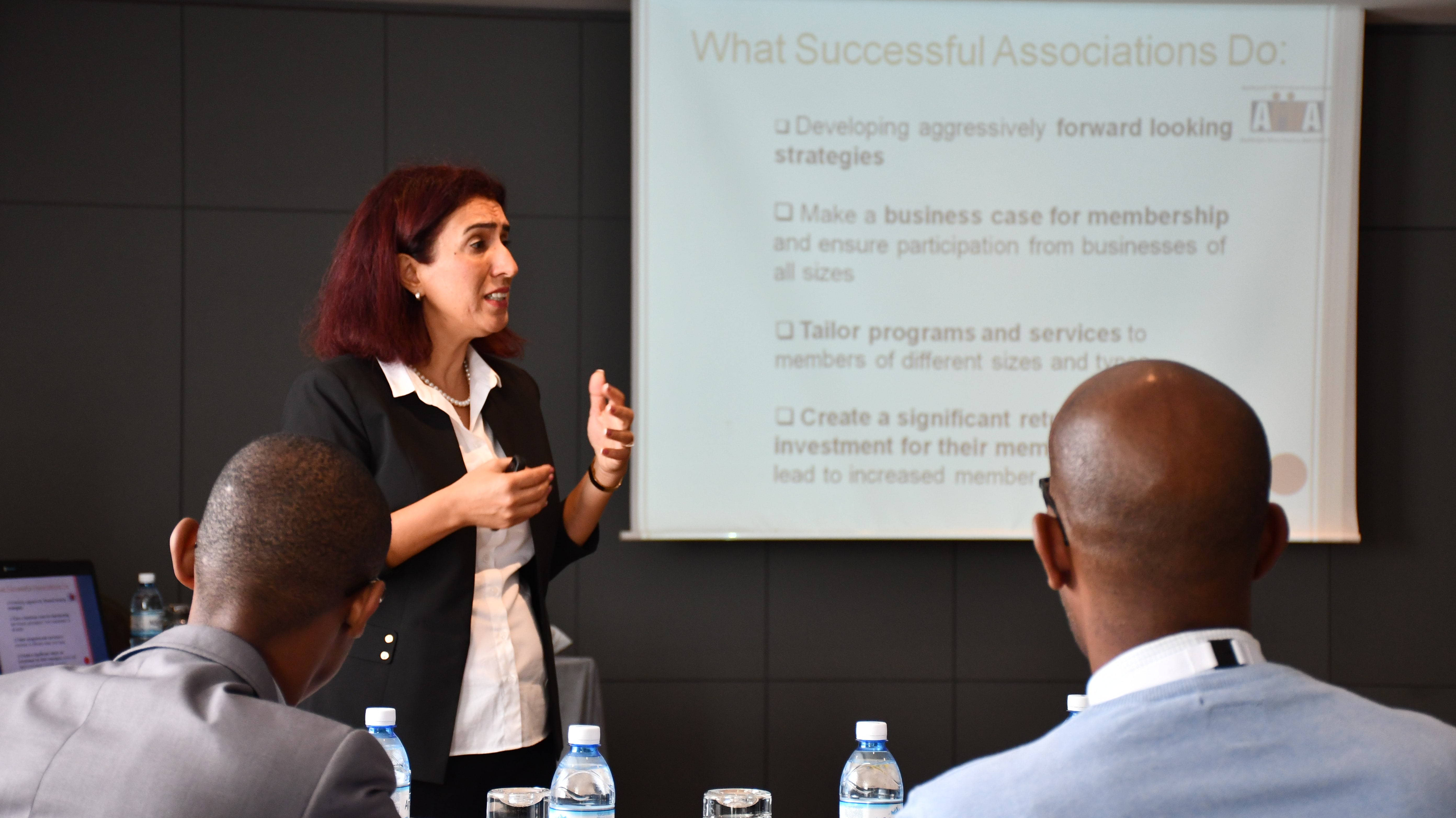Oct 15, 2018 | by The SEEP Network

Jhale Hajiyeva, Executive Director of the Azerbaijan Micro-finance Association, discusses the association's best practices
As part of the Responsible Finance through Local Leadership and Learning program in Rwanda, the SEEP Network organized a five-day study tour in Baku, Azerbaijan for a six-person Rwandan delegation composed of representatives from:
The goal of this study tour was to help participants draw lessons from the Azerbaijan Microfinance Association’s (AMFA) promotion of Responsible Finance in their market and successful strategies for management of a microfinance association with a vision of sustainability. These subject areas were selected to ensure that AMIR continues to build its capacity to play a pivotal role in promoting Responsible Finance throughout Rwanda.
The study tour agenda was designed to provide the participants with opportunities for experiential learning and in-depth training through interaction with practitioners and experts who have contributed to AMFA’s success and longevity. A range of sessions over the course of five days exposed participants to topics such as association services, communication strategies, financial and operational sustainability as well as the role of associations in promoting responsible finance.
AMFA is a valuable longstanding member of The SEEP Network and has hosted multiple study tours in the past. AMFA has been a registered association for almost 15 years and has made responsible finance a key strategic focus since 2016. Key activities during this period include certifying staff members to conduct SPI-4 and Smart Campaign Client Protection (CP) Assessments. Continuing to focus on responsible finance, AMFA has chosen the topic as the theme for its 2018 Annual Conference.
AMFA has also established strong models of sustainability, which has proven crucial when facing a financial crisis, that other microfinance associations can learn from. As currency devaluation took place in other countries in the region, AMFA and its members started preparing for a similar situation in Azerbaijan. AMFA had implemented a sustainability plan which involved becoming less dependent on donor funding and only considering income received from membership fees and from services they were certain they could provide in their budgeting process. These services include but are not limited to trainings, conferences, investor fairs, annual award dinner, workshop/seminar, and CP assessments.
This strategy paid off when Azerbaijan, whose economy is heavily dependent on oil revenues, experienced a sharp currency devaluation in both February and December of 2015 due to a global oil price drop in August of 2014. Along with devaluation, the depreciation of local currency meant that people with savings in local currency lost up to 50% of value overnight. Other effects within the sector included a slowdown in business development, closure of many banks and microfinance institutions and, most noticeably, many investors and donors leaving the country. Thanks to its sustainability plan and its implementation, AMFA was able to weather the financial storm and is till this day a financially sustainable association.
Members of the Association of Microfinance Institutions in Rwanda (AMIR) brainstorming on lessons learned
Participants expressed a sincere appreciation of AMFA’s strengths as an association and the vision that made it able to maneuver around the financial environment. Here are a few key takeaways from the visit:
Focus on becoming a strong, financially sustainable and credible association that:
Leverage the role of an association and network to promote responsible finance by:
This study tour is the second that SEEP has organized for Rwanda-based participants as a means to strengthen the local association and its stakeholder’s understanding of best practices in Responsible Finance ecosystems. A report of the first study tour to India can be found here.
Please stay tuned for a published report on the AMIR/AMFA Study Tour, which will be available by the end of the year!
Categories: Microfinance Livelihoods Monitoring and Evaluation Financial Inclusion Consumer Protection Sub-Saharan Africa Responsible Finance English Blog Responsible Finance Blog 2018 WebinarsBlogs

1621 North Kent Street, Ste 900,
Arlington, VA, 22209
P 202.534.1400
F 703.276.1433
Website Photos: © mari matsuri
